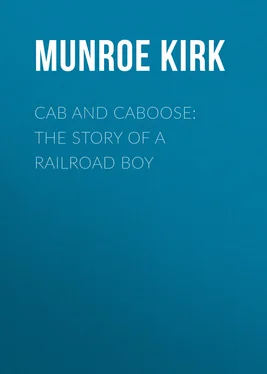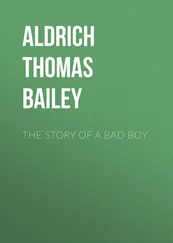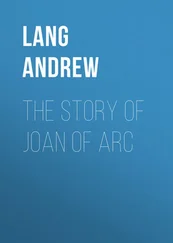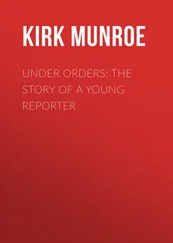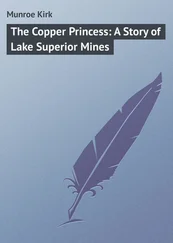Kirk Munroe - Cab and Caboose - The Story of a Railroad Boy
Здесь есть возможность читать онлайн «Kirk Munroe - Cab and Caboose - The Story of a Railroad Boy» — ознакомительный отрывок электронной книги совершенно бесплатно, а после прочтения отрывка купить полную версию. В некоторых случаях можно слушать аудио, скачать через торрент в формате fb2 и присутствует краткое содержание. Жанр: foreign_children, foreign_antique, foreign_prose, на английском языке. Описание произведения, (предисловие) а так же отзывы посетителей доступны на портале библиотеки ЛибКат.
- Название:Cab and Caboose: The Story of a Railroad Boy
- Автор:
- Жанр:
- Год:неизвестен
- ISBN:нет данных
- Рейтинг книги:4 / 5. Голосов: 1
-
Избранное:Добавить в избранное
- Отзывы:
-
Ваша оценка:
- 80
- 1
- 2
- 3
- 4
- 5
Cab and Caboose: The Story of a Railroad Boy: краткое содержание, описание и аннотация
Предлагаем к чтению аннотацию, описание, краткое содержание или предисловие (зависит от того, что написал сам автор книги «Cab and Caboose: The Story of a Railroad Boy»). Если вы не нашли необходимую информацию о книге — напишите в комментариях, мы постараемся отыскать её.
Cab and Caboose: The Story of a Railroad Boy — читать онлайн ознакомительный отрывок
Ниже представлен текст книги, разбитый по страницам. Система сохранения места последней прочитанной страницы, позволяет с удобством читать онлайн бесплатно книгу «Cab and Caboose: The Story of a Railroad Boy», без необходимости каждый раз заново искать на чём Вы остановились. Поставьте закладку, и сможете в любой момент перейти на страницу, на которой закончили чтение.
Интервал:
Закладка:
Kirk Munroe
Cab and Caboose: The Story of a Railroad Boy
TO THE PUBLIC:—
In the execution of its purpose to give educational value and moral worth to the recreational activities of the boyhood of America, the leaders of the Boy Scout Movement quickly learned that to effectively carry out its program, the boy must be influenced not only in his out-of-door life but also in the diversions of his other leisure moments. It is at such times that the boy is captured by the tales of daring enterprises and adventurous good times. What now is needful is not that his taste should be thwarted but trained. There should constantly be presented to him the books the boy likes best, yet always the books that will be best for the boy. As a matter of fact, however, the boy’s taste is being constantly vitiated and exploited by the great mass of cheap juvenile literature.
To help anxiously concerned parents and educators to meet this grave peril, the Library Commission of the Boy Scouts of America has been organized. EVERY BOY’S LIBRARY is the result of their labors. All the books chosen have been approved by them. The Commission is composed of the following members: George F. Bowerman, Librarian, Public Library of the District of Columbia, Washington, D. C.; Harrison W. Graver, Librarian, Carnegie Library of Pittsburgh, Pa.; Claude G. Leland, Superintendent, Bureau of Libraries, Board of Education, New York City; Edward F. Stevens, Librarian, Pratt Institute Free Library, Brooklyn, New York; together with the Editorial Board of our Movement, William D. Murray, George D. Pratt and Frank Presbrey, with Franklin K. Mathiews, Chief Scout Librarian, as Secretary.
In selecting the books, the Commission has chosen only such as are of interest to boys, the first twenty-five being either works of fiction or stirring stories of adventurous experiences. In later lists, books of a more serious sort will be included. It is hoped that as many as twenty-five may be added to the Library each year.
Thanks are due the several publishers who have helped to inaugurate this new department of our work. Without their co-operation in making available for popular priced editions some of the best books ever published for boys, the promotion of EVERY BOY’S LIBRARY would have been impossible.
We wish, too, to express our heartiest gratitude to the Library Commission, who, without compensation, have placed their vast experience and immense resources at the service of our Movement.
The Commission invites suggestions as to future books to be included in the Library. Librarians, teachers, parents, and all others interested in welfare work for boys, can render a unique service by forwarding to National Headquarters lists of such books as in their judgment would be suitable for EVERY BOY’S LIBRARY.
Signed
Chief Scout Executive.
THE PURSUIT OF THE TRAIN ROBBER.—( PAGE 156 Конец ознакомительного фрагмента. Текст предоставлен ООО «ЛитРес». Прочитайте эту книгу целиком, купив полную легальную версию на ЛитРес. Безопасно оплатить книгу можно банковской картой Visa, MasterCard, Maestro, со счета мобильного телефона, с платежного терминала, в салоне МТС или Связной, через PayPal, WebMoney, Яндекс.Деньги, QIWI Кошелек, бонусными картами или другим удобным Вам способом.
.) FRONTISPIECE.
CHAPTER I.
“RAILROAD BLAKE.”
“Go it, Rod! You’ve got to go! One more spurt and you’ll have him! There you are over the line! On time! On railroad time! Three cheers for Railroad Blake, fellows! ’Rah, ’rah, ’rah, and a tigah! Good for you, Rod Blake! the cup is yours. It was the prettiest race ever seen on the Euston track, and ‘Cider’ got so badly left that he cut off and went to the dressing-room without finishing. Billy Bliss was a good second, though, and you only beat him by a length.”
Amid a thousand such cries as these, from the throats of the excited boys and a furious waving of hats, handkerchiefs, and ribbon-decked parasols from the grand stand, the greatest bicycling event of the year so far as Euston was concerned, was finished, and Rodman Blake was declared winner of the Railroad Cup. It was the handsomest thing of the kind ever seen in that part of the country, and had been presented to the Steel Wheel Club of Euston by President Vanderveer of the great New York and Western Railroad, who made his summer home at that place. The race for this trophy was the principal event at the annual meet of the club, which always took place on the first Wednesday of September. If any member won it three years in succession it was to be his to keep, and every winner was entitled to have his name engraved on it.
Snyder Appleby or “Cider Apples” as the boys, with their love for nicknames, sometimes called him, had won it two years in succession, and was confident of doing the same thing this year. He had just obtained, through President Vanderveer, a position in the office of the Railroad Company, and only waited to ride this last race for the “Railroad Cup,” as it was called in honor of its donor, before going to the city and entering upon his new duties.
Now to be beaten so badly, and by that young upstart, for so he called Rod Blake, was a mortification almost too great to be borne. As Snyder left the track without finishing the last race and made his way to the dressing-room under the grand stand, he ground his teeth, and vowed to get even with his victorious rival yet. The cheers and yells of delight with which the fellows were hailing the victor, made him feel his defeat all the more bitterly, and seek the more eagerly for some plan for that victor’s humiliation.
Snyder Appleby was generally considered by the boys as one of the meanest fellows in Euston, and that is the reason why they called him “Cider Apples”; for those, as everybody knows, are most always the very poorest of the picking. So the name seemed to be appropriate, as well as a happy parody on that to which he was really entitled. He was the son, or rather the adopted son, of Major Arms Appleby, who, next to President Vanderveer, was the richest man in Euston, and lived in the great, rambling stone mansion that had been in his family for generations.
The Major, who was a bachelor, was also one of the kindest-hearted, most generous, and most obstinate of men. He loved to do good deeds; but he loved to do them in his own way, and his way was certain to be the one that was contrary to the advice of everybody else. Thus it happened that he determined to adopt the year-old baby boy who was left on his doorstep one stormy night, a little more than sixteen years before this story opens. He was not fond of babies, nor did he care to have children about him. Simply because everybody advised him to send this one to the county house, where it might be cared for by the proper authorities, he declared he would do nothing of the kind; but would adopt the little waif and bring him up as his own son.
As the boy grew, and developed many undesirable traits of character, Major Appleby was too kind-hearted to see them, and too obstinate to be warned against them.
“Don’t tell me,” he would say, “I know more about the boy than anybody else, and am fully capable of forming my opinion concerning him.”
Thus Snyder Appleby, as he was called, because the name “Snyder” was found marked on the basket in which he had been left at the Major’s door, grew up with the fixed idea that if he only pleased his adopted father he might act about as he chose with everybody else. Now he was nearly eighteen years of age, big and strong, with a face that, but for its coarseness, would have been called handsome. He was fond of display, did everything for effect, was intolerably lazy, had no idea of the word punctuality, and never kept an engagement unless he felt inclined to do so. He always had plenty of pocket money which he spent lavishly, and was not without a certain degree of popularity among the other boys of Euston. He had subscribed more largely than anybody else to the Steel Wheel Club upon its formation, and had thus succeeded in having himself elected its captain.
Читать дальшеИнтервал:
Закладка:
Похожие книги на «Cab and Caboose: The Story of a Railroad Boy»
Представляем Вашему вниманию похожие книги на «Cab and Caboose: The Story of a Railroad Boy» списком для выбора. Мы отобрали схожую по названию и смыслу литературу в надежде предоставить читателям больше вариантов отыскать новые, интересные, ещё непрочитанные произведения.
Обсуждение, отзывы о книге «Cab and Caboose: The Story of a Railroad Boy» и просто собственные мнения читателей. Оставьте ваши комментарии, напишите, что Вы думаете о произведении, его смысле или главных героях. Укажите что конкретно понравилось, а что нет, и почему Вы так считаете.
